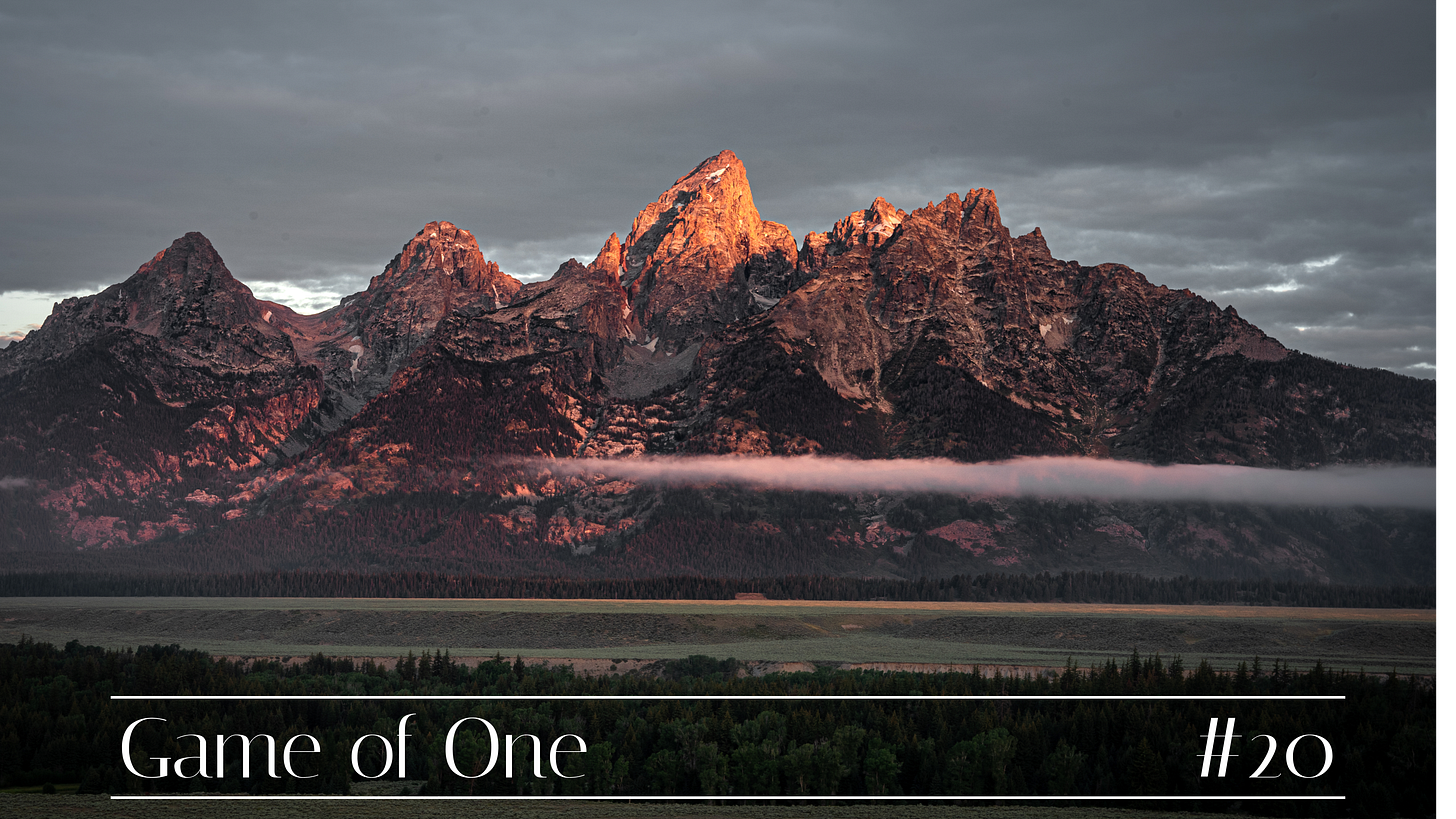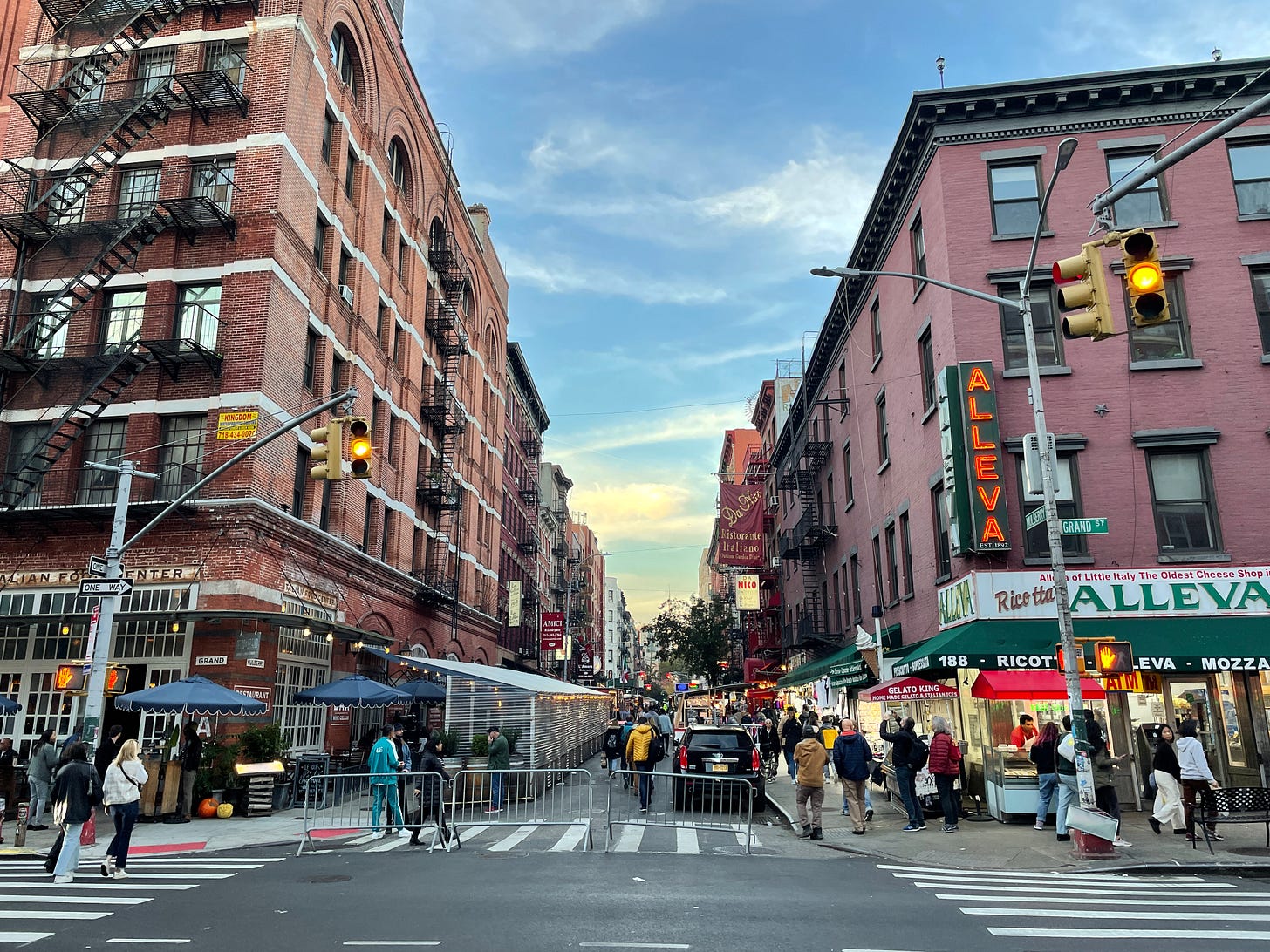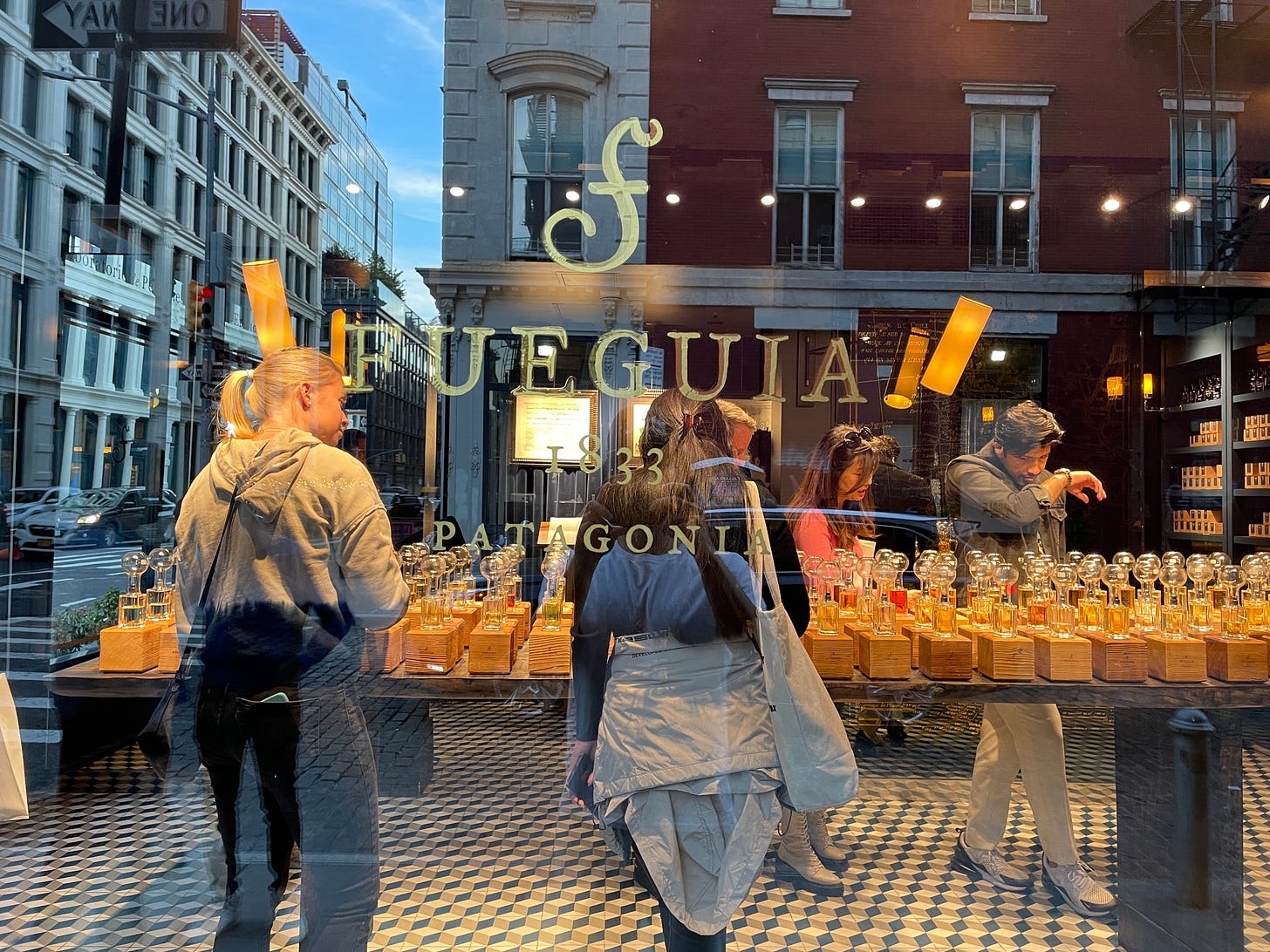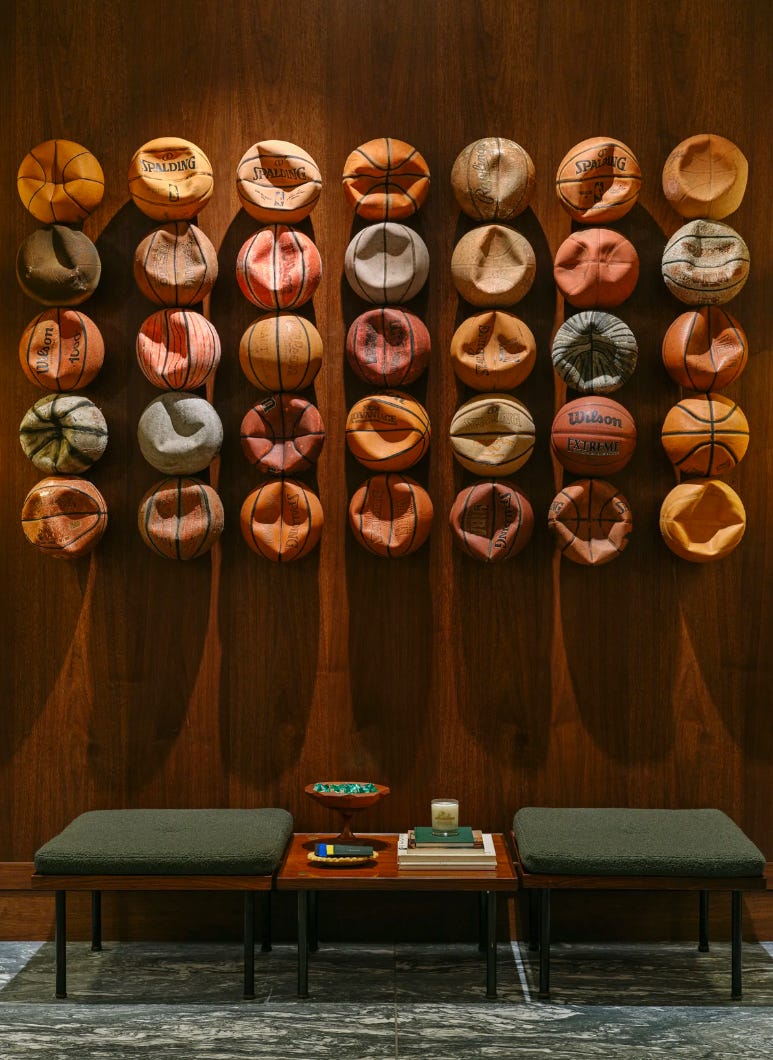#20: NYC energy, Watches, Bullshit Jobs
what time is it?
I’ve been in New York City for a few weeks. The energy here is ever-present, yet hard to articulate. On one of my first nights here, I was walking back home from the office at 10pm and called my mom on the short walk back to my friend’s place where I was crashing. She was worried about me walking alone at night in the city and told me to not wear my airpods while walking so I could be more alert of my surroundings. In order to quell her worries, I started to describe to her what I was seeing. First, I walked past a restaurant where three groups were still wrapping up dinner outside. Then a couple walked past me and by the time I told her that a girl walking her small dog walked by, I think she got the point. All the people who are still out and about combined with the bright lights everywhere creates a sense of safety because you’re never truly alone. My apartment doesn’t even have curtains and is right off a busy street so I’ve had to learn to fall asleep with the outside lights still shining and to stay asleep through the early morning rumbles.
New York is the only city I’ve lived in where you can feel a strong desire to work hard and also be creative. Every day I walk down Grand Street on the way to the office and pass by all the aunties and uncles in Chinatown setting up their stalls of fresh fruit, houseplants, and fake shoes. Like clockwork, they start setting up around 7:30am and are done by 8:30am which I’ve figured out over the past couple weeks of walking to the office at different times. How I start my day is slightly different everyday because I can start my day exactly how I want and I’m in no rush, but theirs doesn’t change. I didn’t realize this at first, but it’s obvious now that every outdoor stand needs to be closed down and set up each day.
In the evening, they need to take all the unsold product and put it in a box and then every morning the stands are set up before the merchandise is placed back. As I walk by, I can’t help but notice that they all like they’re a foot shorter than me with hunched backs. As I head towards my workplace and pass by theirs, I think about these older people who don’t have a choice but to continue the manual labor that they’ve likely long ago accepted as routine. I wonder, if this is one manifestation of hard work, and if we assume that hard work can exist in different forms, then what does hard work look like for me, a “knowledge worker”? I wonder if the Chinatown aunties and uncles still have dreams.
Walking past Little Italy on Mulberry Street is the informal transition plane that separates Chinatown and Soho. The Chinese characters disappear and new signs emerge. To anyone who doesn’t know Chinese, I suspect walking in Chinatown past all the foreign signs, strange smells, and loud noises would feel sensory overload and perhaps even “exotic”. To me, this feels comforting and instead, my sense of adventure is in Soho where everyone dresses in the most outspoken, yet true-to-themselves way and where you can find stores like a Patagonian perfume store.
Once I get to the office, I grab an open standing desk where I can spend a few hours staring at a large monitor while being fueled by a nice mug of coffee. When I go grab lunch or take an afternoon walk, I’m reminded again of where I am. Last week there was a film crew shooting an ad for a jewelry brand right outside the office as I was coming back from lunch. There was a male actor and a female actor, playing the role of a wealthy couple who were leaving their apartment with their suitcases to head to the airport for presumably a getaway. I only realized later on that I had actually walked by the male actor when I was first leaving for lunch, but didn’t know at the time he was an actor because it’s normal to walk by people with nice outfits in Soho. It’s not the presence of attractive people or expensive brands that fuels my creativity; it’s seeing people wear wild outfits that push the boundaries of conventional thinking that in turn makes me think about my own stuff through a more creative lens. On multiple occasions, I’ve seen a fashion photoshoot happen where the model and cameraman are waiting on the sidewalk staring at the traffic light and once it turns red, they run onto the middle of the street where the model can lay down and strike a pose. During an afternoon break, I stopped by the Rick Owens store around the corner and noted that even the furniture and lighting seemed to be intentionally designed, curated, and positioned. Earlier this week, I walked two blocks and waited in line to check out Aimé Leon Dore, one of the more ‘hype’ brands right now. I didn’t buy anything, but I still appreciated the juxtaposition of the All-American vibes of worn out basketballs with books on the classic artists of the Renaissance.
I have these observations on fashion and culture, but I’m really not into clothes or staying on top of the latest trends. What I do know is that being surrounded by all this is certainly helping me stay fueled up on creative energy.
Money, money, money
Over the past few weeks I’ve been meeting new people, mostly through mutual friends. Through a high school friend who now works in growth equity, I found myself at a birthday party surrounded by other finance people (mostly private equity dudes). I always thought that New York was this diverse melting pot of different backgrounds and industries, and I think that is still true, but there is a natural gravitational force that causes people to hang out with people who are similar to themselves. In San Francisco, I felt like there was one big bubble - the tech bubble. In NYC, it feels like there are multiple bubbles, like the tech bubble, the finance bubble, the fashion bubble, the entertainment bubble, etc. Without intentional steps to not be in a particular bubble or rather participate in multiple bubbles, you’ll inevitably get sucked into the one that you fit the most into.
As a curious observer who has heard that private equity pays extremely well, I wanted to comprehend what it’s like to be in this world. Since the typical path to work in private equity, growth equity, or at a hedge fund requires an initial grueling two years of 80+ hour weeks in investment banking, I wanted to understand their inner clockwork. I asked my friend (only 25 years old) who makes $350K per year what he plans to do with all his money and he said he’s just going to keep buying more stocks. I asked him what he wants to do with all those stocks and he said he didn’t know. I’ve talked to other friends who make good money and there’s definitely a pattern forming. After being told that getting straight As is important to get into an elite college to get coveted internships to get a good job to get a fat paycheck, many are left wondering “Now what?” Some people know what they want, but lack the resources. Others have tons of cash swirling around their bank account, but don’t know how to spend it.
Back at this birthday party, one thing that stuck out is how often work came up as a conversation topic. These private equity guys would discuss the various deals that were floating around the market and always frame it using the word ‘We’, like “We were looking into company A, but decided to stop pursuing.” It was as if they were constantly representing their employer, even on weekends and for projects that they weren’t directly involved in. What’s striking to me is how intertwined work can be with their sense of identity while they simultaneously acknowledge that their job is not vital to the a functioning society. One guy literally told me that if his industry (private equity) disappeared overnight, not much would happen - society would not crumble into pieces. This coincidentally ties in with the book I’m reading right now, Bullshit Jobs:
Shit jobs tend to be blue collar and pay by the hour, whereas bullshit jobs tend to be white collar and salaried. Those who work shit jobs tend to be the object of indignities; they not only work hard but also are held in low esteem for that very reason. But at least they know they're doing something useful.
Those who work bullshit jobs are often surrounded by honor and prestige; they are respected as professionals, well paid, and treated as high achievers - as the sort of people who can be justly proud of what they do.
Yet secretly they are aware that they have achieved nothing; they feel they have done nothing to earn the consumer toys with which they fill their lives; they feel it's all based on a lie - as, indeed, it is.
… Say what you like about nurses, garbage collectors, or mechanics, it’s obvious that were they to vanish in a puff of smoke, the results would be immediate and catastrophic. A world without teachers or dock-workers would soon be in trouble, and even one without science fiction writers or musicians would clearly be a lesser place. It’s not entirely clear how humanity would suffer were all private equity CEOs, lobbyists, PR researchers, actuaries, telemarketers, bailiffs or legal consultants to similarly vanish. (Many suspect it might markedly improve.)
The intention here is not to shit on these people who have Bullshit Jobs, but more-so point out my observations. If anything, props to the them for acknowledging, for the first step to go from a Bullshit Job to Not-A-Bullshit Job is first recognizing that you have one.
Do you have the time?
At some point during this night, we start talking about watches. I think it started because I asked another private equity guy what he plans to spend all his money on to which he explained that a common first big purchase is to buy a nice watch. He showed me his watch and then explained how watches often come up as a conversation topic when you’re at happy hour or at dinner with a client. One time, some random stranger at a bar saw his watch and then proceeded to walk up to him and strike up a conversation. That doesn’t seem that crazy to me since every relationship starts out as two strangers having something in common. But what is funny to me is I asked him (at this party of mostly dudes) if wearing a nice watch ever works with girls - would a girl ever notice a guy’s Rolex or Patek and strike up a conversation and he said “No, it only works on guys”.
Watches are bewildering to me since I would never buy one. First of all, I have tiny wrists so wearing a fancy timepiece would only draw more attention to my proportionally small forearms. Since I’m fairly active, I would be worried all the time about losing it or damaging it and I also wouldn’t want to deal with constantly taking it off and putting it back on. Also, I’m sure they were quite useful during the pre-mobile phone era, but nowadays, I wonder how often someone actually uses it for its intended purpose of telling time. Having a nice watch used to be a way to flex your wealth, but that’s a relic of the past. Imagine a meeting where there’s ten sharply dressed people in suits (and fancy watches) sitting around a beautiful, hand-carved wooden table but there’s one other person who’s on Zoom wearing a hoodie in the comfort of their own home. If you had to guess, what’s the power dynamic here? Who do you think is the boss?
Above all, the possession of a watch is a signal that the wearer needs to know, at times, what the time is. What does that actually mean? It means that their life runs on a schedule where there are specific events bound by specific start and end times. That describes almost all jobs, but there are some people who don’t have to live their lives this way by having to check their calendar in the morning. The obvious demographic to live this life are the retired, but no young person would actually want to swap places with a retiree no matter how wealthy they are. That leaves the self-employed who have figured out how to make enough money to afford their lifestyle without hiring so many employees that now their company controls them rather than the other way around. Achieving this type of life by no means easy or straightforward, but I do think that it is the optimal way to work.
During a weekly Benchmark partner dinner, Peter Fenton, the longest-standing active partner at the firm, explains why they don’t have any clocks in the room and recounts this story about some unnamed venture capitalist explaining to him why they keep a clock in the meeting room that’s purposefully 6 minutes ahead. The guy explains to Peter that they do this so that when they’re in a bad meeting, with presumably a founder pitching to them, they can point to the clock and get out earlier. Benchmark takes a different approach with no clocks and they also never set an agenda for their weekly partner dinners. Known for their equal partnership model and intentional modesty in fund size, Benchmark is known as one of the best VC firms, but what I find most fascinating is how thoughtful they are in how they operate, even down to the tiny details like the shape of the table that they have these dinners on:
One of the challenges which has been manifested right now is that in a table where there's a head of the table, you can get a dominant participant in a dinner conversation. But the problem of the table is that you either have a rectangular structure which carries a power structure embedded in it or you have a circular table, which atomizes the group.
- Benchmark Part II: The Dinner
Also, what’s absolutely wild to me is that as I only just realized that in my apartment that I’m currently subletting, the coffee table is the exact same shape:
But I digress. Table shapes are not the point and neither are watches. I only bring up watches to serve as a metaphor for what people desire. From the birthday party, I re-confirmed that I’m not interested in watches or the private equity investor lifestyle. But then that got me thinking, what kind of life do I want? (to be determined…)
“Making money is procrastinating.”
Whenever I come across a quote that resonates with me, I copy and paste it into my Apple notes app on a page aptly titled “Quotes”. I can’t remember who said this or where I saw it and sadly Google search isn’t helping much. The quote doesn’t make sense at first, but if you squint your eyes and scrunch your eyebrows and think hard enough, it does end up making some sense.
Making money is procrastinating.
- someone
Let me explain. In order to make money, we have to do a job. For of us, this is a 9-5, 40 hour per week kind of job. Let’s leave investing and other passive income streams aside for the sake of this. We ultimately trade our time for money and while we work, we cannot do other things. We can’t do the things that we want money for in the first place. I want money so I can afford a comfortable lifestyle filled with good food, quality time with friends, and plenty of skiing, surfing, and hiking. When I’m in the act of making money AKA doing my job, I’m not doing those other things. After all, it’d be pretty hard to surf while in the middle of a meeting. That’s why making money is procrastinating. Any time you spend behind a laptop sending emails, reading Slack messages, or in Zoom calls, is time you could spend doing the things you actually want. I’m by no means anywhere near financial independence or retirement, but I do recognize that a job in the traditional context is a means to an end.
and don’t forget…
The trouble with the rat race is that even if you win, you're still a rat.
- Lily Tomlin
Further reading
I have a lot more thoughts on career, work, money, all that, but it’s almost 2pm and I gotta get to the gym before my coffee buzz wears off. Here are just a few articles I’ve read over that helped me navigate these big questions:
If work dominated your every moment would life be worth living? - Andrew Taggart
You Don't Need to Quit Your Job to Make - Steph Smith
The Omnipresence of Work - Lawrence Yeo










Great issue. My PE experience lines up with how you described it. I left after not only realizing that it was bullshit but also that "making money is procrastination". We're banking all this optionality, and for what? Think you would find this essay interesting.
https://www.thecrimson.com/article/2017/5/25/desai-commencement-ed/